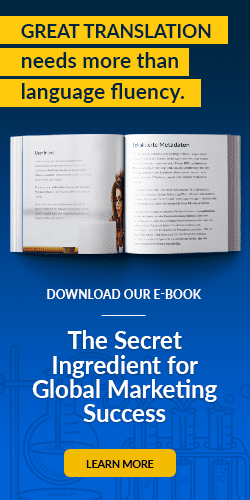Much like customers living in your flagship market, today’s international customers don’t want to go on “trips.” They want experiences they can remember for the rest of their lives. They also want very specific amenities—the features your hotels are uniquely positioned to provide.
Third-party and first-party booking solutions can help hoteliers reach those international customers. But the best way to showcase your properties’ unique characteristics with travelers—and drive more traffic to whatever booking solution you use—is to localize your website in different languages.
Your social media and other digital marketing content can also tell your business’ story in compelling ways. Localizing this content reaches global customers where traditional marketing cannot, and delivers a powerful, persuasive narrative.
Smartly Serving Global Customers
Using third-party booking websites is a fine way to generate business from customers in all markets. But operating a first-party booking engine on your own translated hotel site creates opportunities to better educate prospective global customers, tell your story in ways that capture the imagination, and drive more revenue.
Hoteliers are incentivizing customers to book directly on their websites, where they won’t sacrifice sales commissions—up to 20%, in fact—to third-party providers. They’re especially directing customers to smartphone apps and the mobile web. According to Google, mobile conversion rates on travel sites grew nearly 90% between 2014 and 2015.
This is an especially smart play for hoteliers courting international customers.
Many Asian and Latin American markets have more mobile-first travelers than the U.S. does.
Having a localized smartphone app, available to global customers to directly book with your company, can be a key driver for future business. Countries such as Thailand, China, Indonesia, Brazil, Malaysia and Spain all have much higher percentages of mobile-centric travelers than the U.S. does. In fact, 40% of all digital travel sales will be generated through mobile devices by 2020. In 2016 alone, 25% of Hilton’s business was generated through its smartphone app or website.
Social networks are also a powerful and persuasive source of information for global travelers. Hotel marketers regularly monitor Google Analytics and Facebook Insights to see what content interests customers. They’re quickly adapting to Facebook’s and Instagram’s algorithmic preference for video content, for instance.
This extraordinary shift in how customers research and book travel can empower hospitality companies to take greater control of their narratives in global markets by localizing their content in ways that embrace creative, persuasive, world-class translations—distributed across many channels.
The Power of SEO and Story
Don’t forget to think seriously about SEO in all the languages your customers may be speaking, too.
As we recently wrote, global users—especially in markets that aren’t familiar with your company—aren’t likely to look for your hotel or brand by name. They’ll instead use aspirational search terms such as “affordable hotels in Madrid near Prado Museum” or “resort hotels in Orlando with shuttle to theme parks.”
Your translated content, for use in all channels, should be as evocative and imaginative as the content for your flagship market. Look for web and digital translation solutions that can accurately detect your SEO-rich digital content (like website metadata) and localize them for global customers.
This content can certainly be used to populate your information that appears on third-party booking sites. But it should also be distributed across your other channels in global markets—including your website and social networks. This guarantees that your translations meet your specific needs and marketing goals.
You can also optimize your translated website’s contents and UX to match your global customers’ expectations. For instance:
- Including appropriate cultural references in your copy
- Offering special promotions during locally-relevant travel/holiday months
- Perhaps even showcasing amenities or local attractions that might be of interest to customers from certain global markets
- And more
This level of content customization can help build customer interest, and divert qualified and properly-informed traffic to your booking site.
Reducing Costs Along the Way
In fact, great translation solutions can localize your content while minimizing costs. Digital-first translation vendors keep expenses down by smartly using translation memory, a database where your existing translations are stored for reuse, at no additional cost to you.
This means you translate content only once, pay for it only once, and use it in whatever channel you like—as many times as you like—for as long as you like. This “pay once, use anywhere” approach minimizes expenses and delivers a consistent brand experience across all channels.
Conclusion
To capture the attention of eager international travelers, you need an advanced translation solution that:
- Captures the nuances of what makes your business and brand special
- Leverages localized SEO keywords so your business rises to the top in online searches in any market you’re targeting
- Provides deft, culturally-relevant translations that appeal to local consumers across global markets
- Minimizes costs to help you maximize your bottom-line revenue
It’s a business advantage you don’t want to miss out on. And with the right solution and the best vendor, it’s easier and more cost-effective to leverage than you’d ever realize.
Last updated on April 24, 2018
